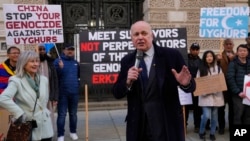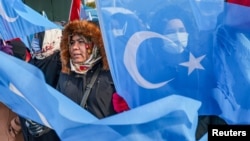A report released by Washington-based Uyghur Human Rights Project accuses UNESCO of sanitizing the persecution of Uyghurs and destruction of their cultural heritage in China.
UNESCO, which stands for United Nations Educational, Scientific and Cultural Organization, "continues to acknowledge China as a protector of Uyghur, Kazakh and Kyrgyz heritage in the Uyghur region," says the report co-authored by Rachel Harris and Aziz Isa Elkun.
In doing so, they write, the agency violates its own standards by failing to acknowledge Beijing's actions toward Uyghurs and other Turkic minorities in China, which include "destroying built heritage and desacralizing religious traditions, and by criminalizing grassroots cultural practices, while using their staged representations to promote China's chosen political narratives."
The rights organization's report accuses China of "strategic cultural cleansing," defined as the targeting of specific individuals and groups based on their cultural, ethnic or religious identity, and the act of intentionally and systematically destroying the cultural heritage of specific people.
Beijing has repeatedly denied the allegations and said the measures taken in the region are for countering extremism, terrorism and separatism.
The Chinese Embassy in Washington did not respond to VOA's questions about China's treatment of Uyghur cultural heritage in Xinjiang.
China has stood by its response in any discussion about Xinjiang, home to a majority of Uyghurs.
"We have made clear our position on Xinjiang-related issues on multiple occasions," said Chinese Foreign Ministry spokesperson Wang Wenbin in response to a question at a news conference this week. "The so-called 'violation' or 'repression' of human rights is the lie of the century propagated by anti-China forces and has long been debunked by facts."
Wang added, "We once again urge parties concerned to look at Xinjiang's strong socioeconomic development in an objective light, stop using Xinjiang-related issues for political manipulation and stop meddling in China's internal affairs."
The Uyghur Human Rights Project report examines five aspects of Uyghur heritage, including music, oral history and storytelling, which have been recognized by UNESCO. It details how China has used those cultural practices to promote revisionist history and exploited them for economic profit and government control.
According to the report, the Chinese government has destroyed large numbers of mosques, shrines, graveyards and historic books and restricted the use of Uyghur and other indigenous Turkic languages. Additionally, hundreds, possibly thousands, of Uyghur, Kazakh and Kyrgyz intellectuals and cultural leaders have been imprisoned.
"As acknowledged by the International Criminal Court, acts of dispossession and destruction of cultural heritage are often the precursor to acts of genocide," said co-author Harris, professor of Uyghur culture at the University of London, in a statement released with the report.
"Attacks on cultural heritage, from sacred architecture to community practices and customs, are inseparable from direct physical attacks on human beings. They are a form of cultural warfare aimed at the elimination of a people and their identity."
According to a UNESCO spokesperson, when UNESCO receives a report from civil society, the information is shared with the concerned member states to elicit a response.
"We have just received this report and we are currently reviewing it, as we do for all reports sent by civil society and NGOs," a UNESCO spokesperson told VOA in an email.
"The practice and procedure is that when UNESCO receives precise and credible information about a specific element inscribed on a UNESCO list, this information is shared with the concerned Member States, so as to bring both the information shared by civil society and the Member State's response – if any – to the attention of the appropriate Committee (in this case, the World Heritage Committee and the Intangible Cultural Heritage Committee)."
The U.N. Office of the High Commissioner for Human Rights has acknowledged possible crimes against humanity in the region. A growing number of governments have expressed alarm about the situation, with the U.S. calling it genocide and crimes against humanity.
The report said that since as early as 2014, Uyghur and Turkic people in the Uyghur region have suffered from securitization, mass incarceration and attacks on their cultural identity. Over a million people are estimated to have been detained in political education camps, prisons and detention centers where they are subjected to torture, rape, cultural indoctrination and forced labor.
China's management of Uyghur cultural heritage is aimed at increasing government control over the population, primarily through the use of Uyghur cultural heritage as a propaganda tool and in tourism, according to the report.
The promotion of Uyghur cultural gatherings and music has served to reinforce the designation of Uyghurs as dancing and singing "ethnic minorities" and "normalize PRC control of their ancestral lands," the report said.
"Culture bearers are dispossessed and imprisoned while their history is rewritten and the economic benefits of their heritage flow back to central China," Elkun said in the statement accompanying the report.






